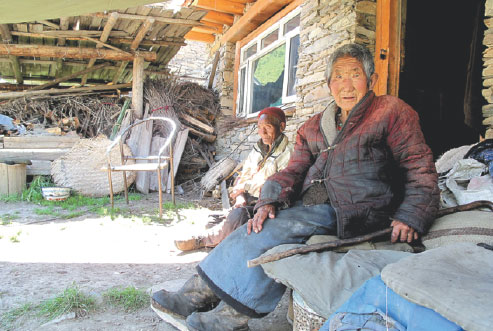Death of a local hero
Updated: 2015-08-20 07:42
By Li Yang(China Daily)
|
||||||||
|
Serthar (left) sits with a fellow villager in front of his house. Li Yang / China Daily |
Self-effacing
The villagers described Rinchen as an introverted young man who, despite being the only boy from a poor family in Zoige, a county near Ger Dengma, had graduated from Aba Normal College. He arrived in the village in 2010 on a central government program set up two years earlier to encourage talented graduates to work in the countryside and lower rural unemployment levels by developing small communities.
"It's natural for a soldier to die on the battlefield. My grandson just died on his own battlefield," said Karkho, Rinchen's grandfather. The 75-year-old retired soldier spoke of his grandson with pride. "He died a great death because he died for others, not for himself," he said.
Crying and constantly working a string of Buddhist prayer beads, Rinchen's mother, Nagapan, said her son was a self-effacing man. "He seldom spoke about his work. He was such an honest and thoughtful boy. He told us the governments in the Tibetan areas needed well-educated people like him, people fluent in both Chinese and Tibetan. He said helping poor people made him happy," she said.
Pressure of work mean that Rinchen had only spent three days in his home village since 2010, when he paid a visit during the Spring Festival holiday last year. Even when his father, Gyakho, a shy, taciturn 54-year-old who has advanced liver and thyroid diseases, was thought to be at death's door in the hospital in neighboring Dujiangyan city, Rinchen didn't visit. Instead, he phoned to apologize for not being able to visit because, "there was too much work to do", said Gyakho, who looks far older than his age. "I thought he was even busier than the county head."
Gyanltsan, head of the local government department that oversees the work of civil servants, said: "Since the funeral, Rinchen's family hasn't asked us to do anything special. In fact, they even apologized for the 'trouble' they had caused the government after it mobilized so many people to conduct a 24-hour search for their son's body."
He said there are about 3,000 civil servants in the county, which is home to more than 70,000 people from the Tibetan, Qiang, Hui and Han ethnic groups. In the last four years, nearly 15 percent of local officials have used personal connections to secure transfers to other areas with better conditions and higher standards of living. The outflow has been particularly notice-able at the grassroots level, and although the county has engaged about 183 graduate officials since 2008, more than 80 have already left their posts, according to Gyanltsan.
Rinchen had volunteered to work in the remotest and least-developed village in the area for five years, far longer than any of the 100 graduate officials currently employed. "He said he was young, and his knowledge and education could do a lot for this rundown village," Gyanltsan said.
Local government funding remains the main source of finance for grassroots towns and villages in China's remotest areas, and since his arrival, Rinchen had written reports, and produced petitions and applications to secure money to improve the village infrastructure. In the four years he lived in Ger Dengma, Rinchen's efforts secured more funding than the village had received in the course of its entire history.
"He knew every central government policy for improving people's livelihoods by heart, and he paid close attention to the implementation of the policies by the county authorities," Dowa said.
The village is only accessible by a dirt road, which is often rendered impassable by landslides. A petition written by Rinchen persuaded the county government to provide a special fund to open a 90-km dirt road in 2012, and all the villagers, including Rinchen, worked on its construction. It now takes four hours to travel between the village and the county seat, a journey that used to take about four days by yak along a rambling track.
Running water has only been available since 2012, and the village saw its first solar panels in 2013. With Rinchen's encouragement, most of the residents added shower rooms and flush toilets to their homes.
Rinchen was also determined that the village would have cellphone coverage, and was working on the project at the time of his death.
"If we'd had the signal, Rinchen would not have lost his life," Dowa said. "He maintained good communications and relations with the higher authorities, but was also friendly with all the villagers."
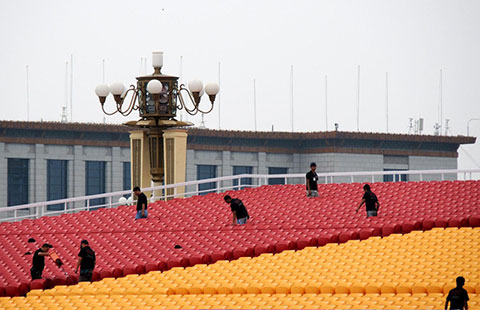
 The changing looks of Beijing before V Day parade
The changing looks of Beijing before V Day parade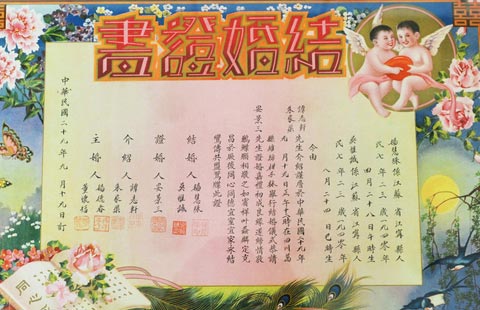
 Nanjing displays ancient marriage, divorce certificates
Nanjing displays ancient marriage, divorce certificates
 Top 10 Android app stores in China
Top 10 Android app stores in China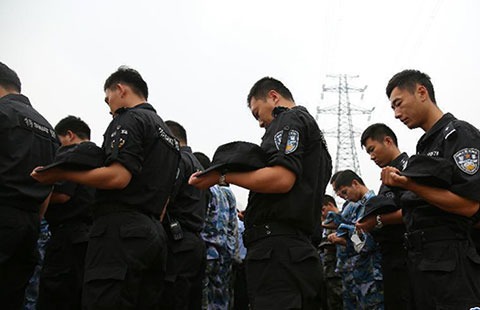
 Ceremony held to mourn victims of Tianjin blasts
Ceremony held to mourn victims of Tianjin blasts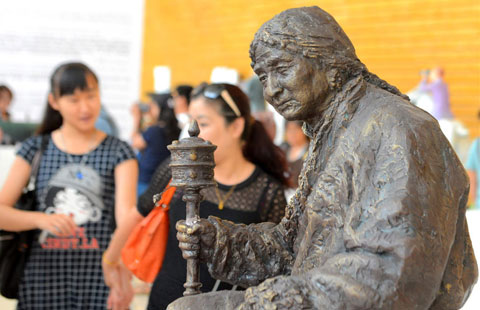
 Silk Road city displays sculptures at exhibition
Silk Road city displays sculptures at exhibition
 Top 10 companies with the most employees
Top 10 companies with the most employees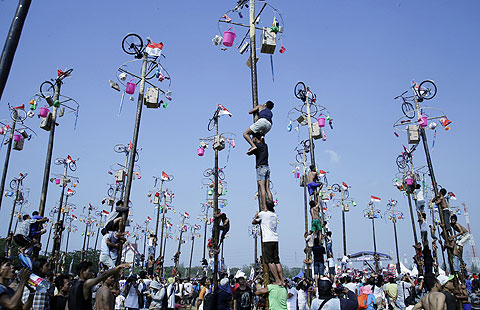
 Men in Indonesia climb greased poles to win prizes
Men in Indonesia climb greased poles to win prizes
 In pictures: Life near Tianjin blasts site
In pictures: Life near Tianjin blasts site
Most Viewed
Editor's Picks

|

|

|

|

|

|
Today's Top News
Fitch warns insured losses from Tianjin explosions could reach $1.5b
Conflicting reports on possible Abe trip
Hillary Clinton breaks with Obama on Arctic oil drilling
At UN, China backs regional peace efforts
Man in yellow shirt is Bangkok bomber: Police
Beijing dismisses reports of Abe's China visit in September
Anti-corruption campaign 'good for China, US'
Police: Man in yellow shirt is Bangkok bomber
US Weekly

|

|
